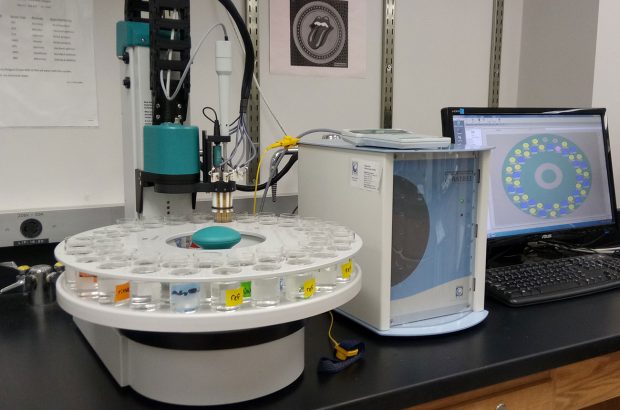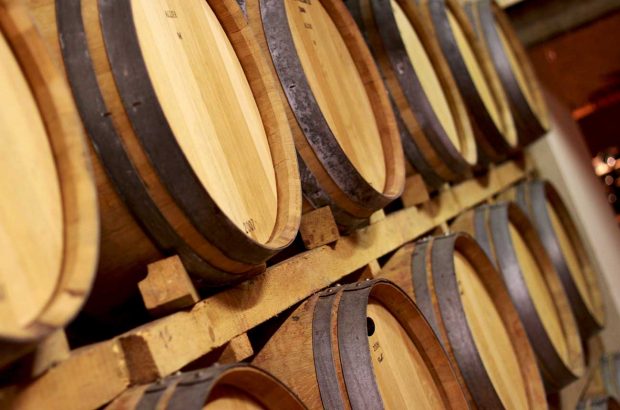As more winemakers ban the use of chemicals on vines, MONTY WALDIN puts the case for organic winemaking and recommends 20 great wines.
It may be unpalatable but the fact is that the overwhelming majority of the world’s vineyards are lazily farmed using chemical weedkillers, fertilisers, pesticides, fungicides and insecticides rather than using organic winemaking techniques. No one knows the long-term effects of these chemicals on the environment, or on our bodies where they become a cocktail of residues. Wines grown organically offer today’s consumer, increasingly weary of food scares, an effective alternative. Organic wines are defined as having been fermented from wine grapes grown without the use of synthetic (man-made) chemicals, or GMOs (genetically modified organisms).
Why isn’t everyone organic? There is no simple answer, but the vineyard manager of the world’s most expensive Bordeaux once said to me: ‘It’s a case of saving the family furniture. If we think we risk losing the crop to mildew or pests like red spider, we’ll spray chemicals.’
https://www.decanter.com/wine/organic/
So chemicals, which became mainstream after World War II to ‘help’ farmers in times of austerity, are seen as an insurance policy.
But this chemical insurance policy should be superfluous. Organics aims to produce vines capable of resisting pests and diseases without chemical aid. After all, vines have grown successfully for 7,950 of the last 8,000 years without them. So instead of weedkillers, organic vineyards allow beneficial weeds or cover crops like barley, vetch and clover, to grow between the vines. They act as a habitat for beneficial insects which attack insect pests such as the spider mites our Bordeaux friend was concerned about. And by taking rainwater from the topsoil, cover crops force vines to root more deeply to slake their thirst. Deeper root systems make for stronger vines, lower yields and more concentrated flavours.
Organic growers avoid chemical fertilisers which boost yields short-term but which, like a diet of fast food, have undesirable long-term consequences. An apple a day keeps the doctor away. No one has ever said that about mass-produced burgers in a bun. So organic vineyards feed the soil using slow-release compost, usually composted organic plant matter or animal manure, to maintain a healthy soil and thus a sustainable yield of grapes.
It’s long, hard outdoor work making organic compost, whereas a sack of chemical fertiliser can be delivered from a phone call made inside a cosy office. Come on, how many classed growth château owners do you know who are prepared to get dung on their silk ties?
Fighting fungus
Organic growers counter vine fungal diseases like mildew with sulphur dust or copper sulphate. Sceptics say organic growers should do without these, although sulphur dust and copper sulphate are respectively a naturally occurring element and a salt. Unlike sulphur, however, copper sulphate does not degrade in the soil. It will soon be banned in European organic vineyards. However, to have mildew-free vineyards, organic or otherwise, would mean scrapping virtually the entire world vineyard. Why? Because it is planted with wine grape varieties such as Chardonnay, Cabernet Sauvignon or Merlot, which are all from the mildew-prone vitis vinifera or ‘wine producing’ vine species.
GM freaks think they have the answer to all Planet Wine’s ills by taking a single resistant gene from a non-vine plant – like moss, barley or mustard – and implanting it in vines. The full effects of ‘man plays God’ GM technology are unknown and so GMOs are banned under organics.
Organics does have plenty of its own contradictions, too. Organic is defined as simply avoiding chemicals, so sustainable practice is optional (and rare). Organic growers can use machine harvesters rather than people to pick the crop, and diesel-belching tractors for ploughing instead of sustainable horses. And when it comes to winemaking, organic rules allow much the same winemaking tools – yeasts, enzymes, acids, pasteurisation and animal fining agents – as the non-organic alternative.
The most common wine preservative, sulphur dioxide (sulphites), is allowed in organics too. Hence in Europe organic wine must be labelled ‘wine from organically grown grapes’ and not ‘organic wine’. Unsulphited organic wines are rare because of their short shelf-life in bottle. Ideally you should obtain these wines direct from the winery after tasting them first with the owner. And organic wines are not per se vegetarian or vegan friendly either due to routine use of animal fining agents like egg white and gelatin from pig bones. So check organic labels for vegan or vegetarian suitability.
The least imperfect form of organic farming is, to my mind, biodynamics –having worked on conventional, organic and biodynamic vineyards I speak from experience. Biodynamics forces growers to be more sustainable. So, rather than trucking organic fertiliser in from an outside supplier, biodynamists make their own compost on the vineyard by keeping animals (which can then be used for ploughing). Plant-based teas, infusions made from oak bark and nettle, are used to counteract pests. Nettles are rich in sulphur, for example, which prevents vine mildew. And such infusions are used only at specific times and on specific parts of the vine – the roots, the flowers, the leaves or the grapes – according to which is most receptive to lunar, solar or stellar forces at any one time.
This common-sense approach can be seen as subversive. But such farming often produces richer, more complex, more appetising wine; often very mineral-like, in fact, truly reflecting the much-abused term ‘terroir’. A naturally grown wine will always give me more pleasure than one constructed around a bunch of chemicals, like a girl who needs no make-up will attract me more than Miss World dripping with eyeliner. So I’d rather drink a biodynamic Bordeaux born of humble terroir at £60 per case than a chemically induced first growth at £3,000 per case. I’m thinking of the cost to the environment rather than my pocket, as well as tastes and flavours.
Increasingly, many of the world’s leading wine producers are adopting organics and biodynamics, some secretly for fear of ridicule, but many quite openly because they sense the marketing opportunity. Others are still resolutely stuck in the post-war mindset, such as our Bordeaux friend. He did try biodynamics on one of his lesser Bordeaux vineyards and got riper, richer grapes. Why does he not try it on his top vineyard? The unpalatable answer for us is that wine is his pain, insurance his pleasure.
https://www.decanter.com/wine-news/bordeaux-new-wine-grapes-419730/
Monty Waldin’s Top 20 Organic Wines:
Chateau Falfas, Cotes de Bourg Rouge 1998
Leading biodynamic Bordeaux estate since 1995. cojsistently ripe and textured.
£8.75; VRo
Domaine de la Grande Bellane, Valreas, Cotes du Rhone Rouge 1999
Concentrated, savoury, spicy, animal-flavoured red Rhone.
£4.99-6.49; Bot, Coo, Sai, Tes, Unw, Vis, WRa
Chateau la Canorgue, Cotes de Luberon Rouge 2000
Bright blend of five biodynamic grapes. Too many Rhone wines smell of cheese (from yeast), but this has cherry aromas.
£6.95-8.25; VRo, Yap
Vina Ijalba, ‘Graciano’, Rioja Tinto 1999
Oak-aged Rioja from 100% Graciano. Sleek but substantial.
£10.45; VRo
Millton, Te Arai Vineyard, Merlot/Cabernet, Gisborne 1998
Bordeaux-style blend of Merlot and Cabernet Sauvignon, aged in French oak. Refreshing with ripe grape and oak tannins.
£7.9-8.99; VRo
Cav Cauquenes, Vinas Viejas, Las Lomas 2000
Thick, earthy red made from unirrigated, 100-year-old Pais vines in southern Chile.
£4.99-5.99; Co, G2W, Vis, VRo
Sonop Wine Farm, Pinotage, Cape Soleil, Paarl 1999/2001
Chunky Pinotage. Lots of wine for relatively little money.
£4.99-6.70; Saf, VRo
Chateau Richard, Bergerac Blanc Sec 2000
Complex, textured dry from Sauvignon Blanc, Semillon and Muscadelle which are picked and fermented together.
£4.99-6.29; Han, VRo
Domaine Guillemot-Michel, Quintaine, Macon-Villages 2000
Benchmark white Burgundy showing mouthwatering fruit and a mineral edge from a biodynamic producer.
£10.50; HHC
Domaine de l’Ecu, Muscadet Sevre et Maine 2000
Full-bodied, earthy Muscadet made from biodynamic grapes.
£5.49-5.99; Saf, Vis, VRo
La Cappuccina, Soave 2000
Garganega grapes, producing smooth, straw-coloured, mouthwateringly ripe Soave.
OWC
Casale Mattia, Frascati 2000
Tangy organic version of Rome’s local quaffer.
£4.99-5.45; Sai, Vis, VRo
Domaine Huet, Le Mont, Vouvray Sec 1999
This Chenin Blanc from France’s leading biodynamic white wine estate smells of fruit rather than wet wool.
£8.49; Vis, VRo, Wat
Domaine Michel Deiss, Mambourg Grand Cru 2000
Biodynamic masterpiece blend of Pinot Blanc and Pinot Gris. High-density vineyard, high-density wine.
L&S
La Riojana, La Nature, Torrontes, Famatina Valley 2000
Organic off-dry and slightly tropical dry white from Argentina.
£4.29-4.49; BGr, Coo, Saf, Sai, Tes, Vis
Bonterra Chardonnay, North Coast 1999/2000
The world’s biggest organic Chardonnay brand. Tropical fruit with a touch of oak.
£8.49; Boo, Bot, Maj, Mor, Odd, Saf, Sai, Thr, VRo, Wai, WCe, WRa
Albet I Noya, Rose d’Anyada, Pinot Noir/Merlot 2000
Modern style, cherry-scented pink blend of Merlot and Pinot Noir from Penedes.
£5.75; VRo
Broughton Pastures, Sparkling Elderflower NV
The world’s first organic sparkling elderflower wine (no grapes in this one!) is made in England. Medium dry.
£8.95-10.95; Vis, VRo
Fleury, NV Brut Champagne
Full-bodied, dry Champagne from biodynamic and mainly Pinot Noir grapes.
£16.99-17.99; VRo, Wai
Casal Dos Jordoes, vintage Character Port
Pure but wild fruit flavours and balanced sweetness.
£11.49-12.50; Vis, VRo.
Written by MONTY WALDIN





